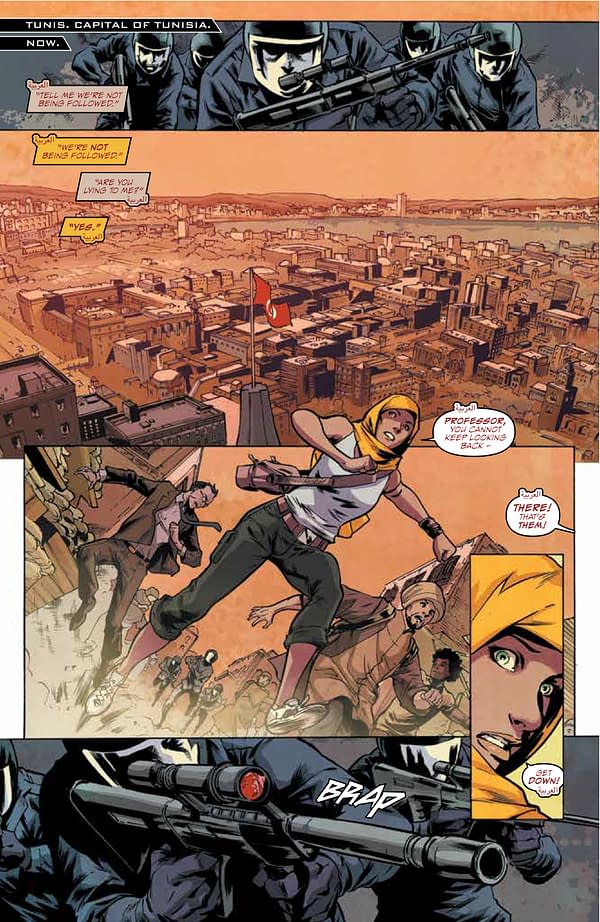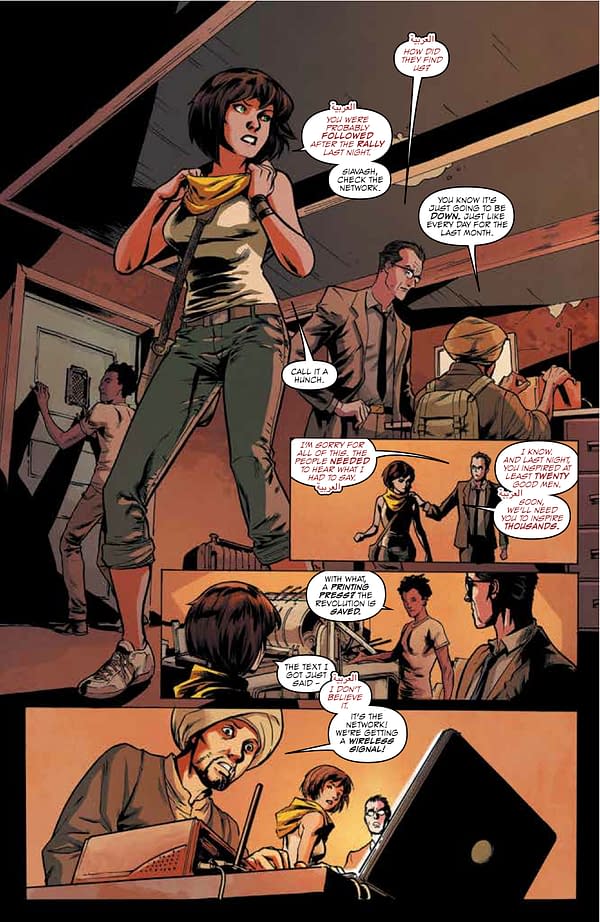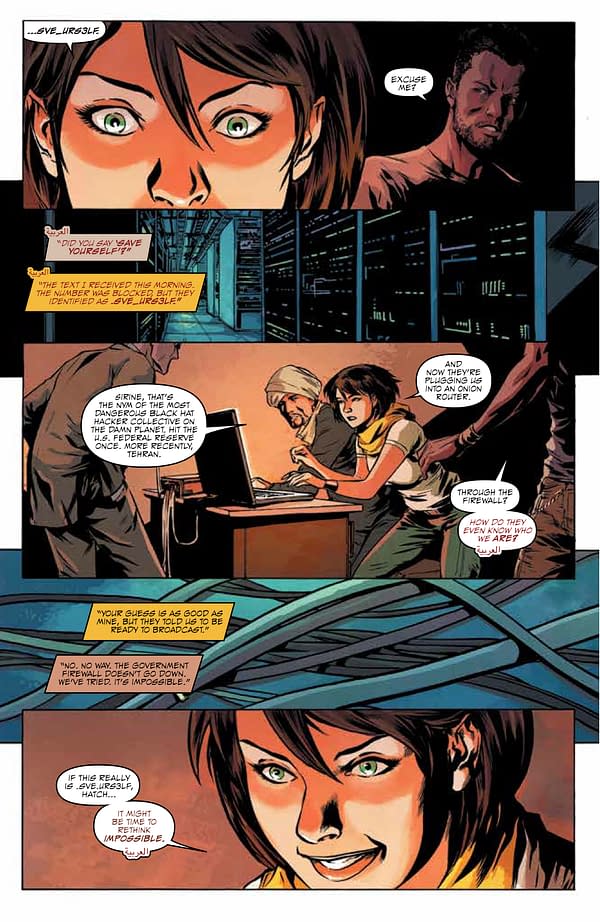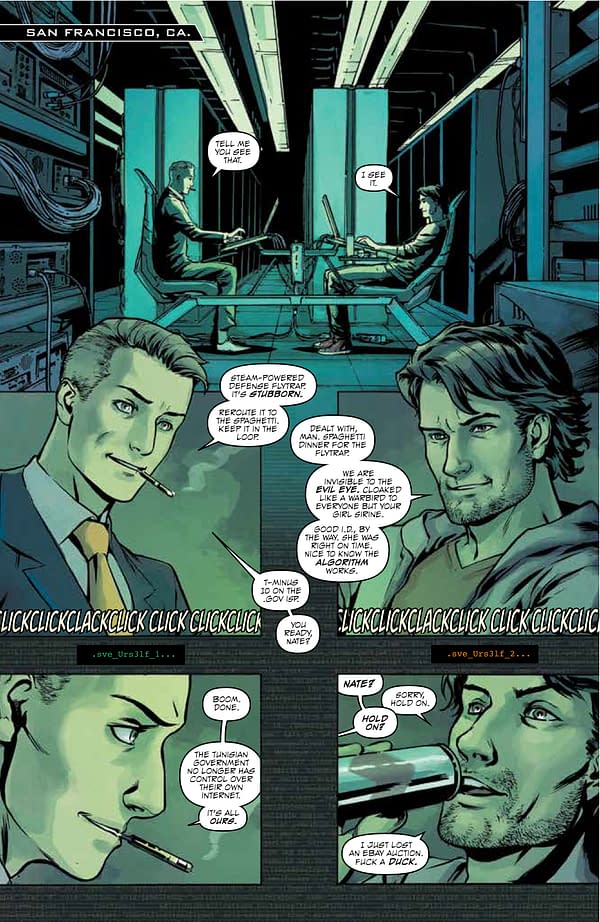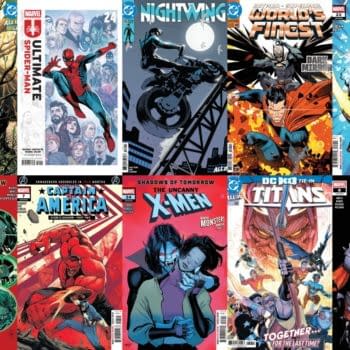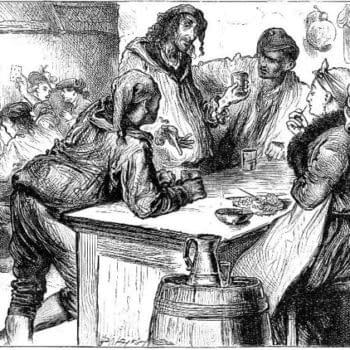Posted in: Comics, Recent Updates | Tagged: Alyssa Milano, archaia, Collin Kelly, Comics, Deren Bennett, entertainment, Hacktivist, Ian Herring, Jackson Lanzing, Marcus To
Hacktivist Asks Us Who We Trust – The Bleeding Cool Interview With Jackson Lanzing and Collin Kelly
Hacktivist, debuting on January 22nd as a new four-part single-issue miniseries from Archaia, poses some very relevant and at times uncomfortable questions about the nature of information control in the digital age, but it does so through the lens of our own interaction with the world via social media and the developing technology surrounding it. With the tag-line "Save Yourself", and drawing on real-life inspiration of the famous and infamous variety, from Anonymous to the Occupy Movement and Edward Snowden, the series takes off the kid gloves and engages directly with the ambiguity we face whenever we share a link, retweet a post, or stand in judgement about the use or misuse of information in the international arena.
The concept for the series was created by Alyssa Milano, and Jackson Lanzing and Collin Kelly write about Ed Hiccox and Nate Graft, fabulously wealthy founders of a social media site who turn to hacking by night as a kind of moral offsetting in the hopes of using technology to bring aid to oppressed peoples. With artwork by Marcus To, colors by Ian Herring, and letters by Deron Bennett, the book feels anything but dryly concept-driven once the wheels of the narrative are in motion. Hacktivist is an unusual combination of profound questioning and fast-paced storytelling that's set to become one of the noteworthy titles of 2014.
Writers Jackson Lanzing and Collin Kelly fielded questions from Bleeding Cool with remarkable dexterity, suggesting that they have analyzed the implications of their book to the Nth degree and have quite happily opened a comics can of worms for our consideration.
Hannah Means-Shannon: What made you want to work on a story that seems to break down the barrier between entrepreneurs and hackers? Do you think it's a dangerous or helpful thing to associate the two?
Jackson Lanzing: That's the fun of the story! When we first sat down with Alyssa Milano—heck, when we were first approached by the incredible Rebecca Taylor, an editor at Archaia—this was the high concept of Hacktivist: "What if Jack Dorsey was Anonymous?" In this age of public information and social upheaval, what if someone had the keys to the whole kingdom? And what if, rather than using it for criminal activity or a power grab, they used it for causes of freedom and justice? What if a couple billionaires snuck into their own server room and started enabling the oppressed to save themselves?
They'd be superheroes. Actual, modern-day superheroes.
Right now, in the real world, there are nearly a billion people with computer access. That translates to nearly a billion people with the ability to change the world at their fingertips, but most of them can only affect things on a local scale. Society calls them hackers, some call them activists, some criminals. Our two entrepreneurs, Edwin Hiccox and Nate Graft, are hyper-enabled and brilliant—they can affect positive change on a global scale. Some call them criminals, others will see them as a beacon of hope. This puts them in a proud tradition of comic book "heroes," men and women who do the impossible in secret for the good of others. No flights or tights, just a great sci-fi story with real-world echoes. It was too rich a story to pass up.
Plus, honestly, you don't say no to Alyssa Milano. Especially when her ideas are incredible.
Collin Kelly: The push and pull of business and philanthropy, of personality and anonymity, of two best friends on either side of a choice—that tension is the heart of drama, which is what made this book completely irresistible to us. Jackson and I have written together for years, and when we looked at the relationship between Ed and Nate, we saw—maybe not in the technical details, but in the thematics—a kind of twisted version of ourselves. With the addition of jaw-droppingly talented Marcus To bringing the vision to life and the modest but absurdly skilled Ian Herring on colors, this book became less something we wanted to do, and more like something we absolutely had to do. It's been a labor of love from start to finish, and we're absolutely thrilled to be able to share it.
HMS: There are quite a few meaningful slogans in the first issue of Hacktivist, like "Save Yourself", "What do you want to do with your life?", and "Do something reckless". Slogans have always been a feature of social movements, but the use of slogans has taken on a whole new meaning in the era of hashtags. How did you decide which slogans would best characterize the story you wanted to tell?
CK: When we first meet Ed and Nate, they're running a social networking company that has Facebook on the ropes—they have millions of followers and billions of dollars, which means that every slogan they Tweet and every hashtag they create is going to have far different repercussions then the same actions from you or I. As super-users, these two know that they have the ability to get a party started in an instant; as the white-hat hacking collective known as ".sve_urs3lf," they know that they have the power to thwart injustice a half world away. That kind of activism however comes with a price, something our boys will learn as they catch the eye of U.S. Cyber Command.
Our approach was simple: Look to the truth. Social networking is a catalyzing force in many of these revolutionary countries, and the people on the streets know it. When you see English language graffitti on the walls, or posters with these hashtags, it's not for them—it's for us at home. It's so that news producers will cut in footage with the words their audience will understand. Selfishly, we also know that watching people type—no matter what movies have tried to feed us—isn't half as interesting as seeing the ramifications of those actions. By embracing trending topics and hashtags, we found a way to visually represent that spread of information, really underlying the global impact what our .sve_urs3lf team is attempting to accomplish in a way that evolves naturally from the story. And of course, it was up to our brilliant letterer Deron Bennett to capture that text-based anarchy, an outstanding feat that he made look effortless.
JL: Remember that tech in Minority Report? You walk into a Gap, it scans your eye, now it knows what to sell you? That's all around us now on the Internet—it's in sponsored Tweets and promoted Facebook posts and we're eating it up because it involves us directly. It makes us the author. Hashtags, slogans, memes, and trends; it's all the same mental adhesive to make ideas stick with you. The digital age has ushered in things like this both as control systems and as organizing tools. Essentially, hashtags can be used both to generate hype (marketing) and to curate a given conversation between interested parties (organizing).
Our book is about two men who embody these two sides of the Internet. Nate Graft is a marketer—he's the face of YourLife and the voice of a generation. He's here to bring people in and get them to stay, to generate a healthy profit, and to throw a never-ending party (on and offline). Ed Hiccox thinks that's childish, insignificant, and short-sighted. He sees potential to bring down governments. The Internet's not frivolous to him, it's the key to making things better. This very conflict is going on in the real world, right now, all over the map. Hacktivist attempts to distill it into character-oriented drama.
HMS: Social Media tool-users are increasingly associated with hacker movements in pop culture, as in the character Skye on the currently running show Agents of S.H.I.E.L.D. Do you think the public perception of hacking of protected information is changing due to the all-access nature of blogging and social media these days?
JL: There's actually a great moment in the fourth episode of Agents of S.H.I.E.L.D. that addresses this head-on. Skye uses Instagram to track a perp, during which Coulson explains that people are practically surveilling themselves these days, which makes the job a lot easier for the men in suits. This use of public surveillance is presented as heroic—even necessary—on a network drama, so I'd say we've definitely opened our mind to the idea that hacking of protected information is not always malicious or unwise.
However, in fiction, hacking is still usually presented as magic. Our mission statement was to avoid that whenever possible. Hacktivist tries to explore the private lives and interpersonal conflict between hackers, activists, and governments—and show the impact that has on a wide scale. Like a good heist film, we want the audience to learn and understand the tricks of the trade, to never feel buried under technobabble. Trust me: If we can understand it, so can our readers, and that's hopefully one of the joys of reading the book.
CK: The simple truth here is that Jackson has a great head on his shoulders for this stuff… but I'm a luddite. When we started this project, I couldn't tell you the difference between a DDoS and a DOS prompt. But one thing we refuse to be is disingenuous, which meant actually breaking out computer science textbooks and learning. We had a pro digital security analyst (or perhaps amateur—he wouldn't tell us what color hat he wore) as a consultant, who was steering us to the truth in all things. Because we're not hackers—far far from it–we were able to see the tools as apolitical, freeing us to be as creative with their execution as we possibly could, while staying absolutely grounded in fact. In fact, I think we even gave our consultant some interesting new ideas, for better or worse. Some of the things our characters are able to do might seem like science fiction, but we took incredible pains to make sure that Hacktivist, unlike other depictions of hacking in the media, is entirely science fact.
HMS: What do you think of Edward Snowden's Christmas speech? Or if you didn't catch it, the concept that we have to "save ourselves" from the overzealous monitoring by governments that will mean no child is "unwatched" in the upcoming generation?
CK: We had been working on this project for about nine months when I get this breathless call from Jackson: "Have you heard about Snowden?" I had just woken up, but we live in Los Angeles so I'm pretty sure that he wasn't talking about the weather. Pretty soon, I'm neck deep reading about this NSA leaker who was fighting for information freedom on a global stage… and the similarities to our own characters were staring us in the face. Our fiction was coming to life in front of us, and purely because we had hypothesized that someone from within the system would break out. The fact that one of our protagonists is named Ed is, we swear to you, pure coincidence.
The speech had one moment that really stood out to us, which was when Snowden said that "privacy is what determines who we are, and who we want to be." What someone chooses to keep secret—what they freely give away—tells you a lot about the kind of person they are, which is as true in life as for the characters within our story. There's a reason our duo call themselves Save Yourself—though they can fight the biggest of Big Brothers, real change has to happen from the ground up. Snowden closes by saying there's an ongoing conversation about trust and technology going on; we'd like to think that Hacktivist is a voice that hasn't been heard yet.
JL: Privacy is a very real and very nuanced concern, especially in recent years. We're not advocating in one direction or another on that regard; Edward Snowden's fight isn't really the same as Edwin Hiccox's. Privacy concerns are certainly part of our story, but they are not the point. Ed's eyes are on a different prize: He sees the enormous potential in shared global information and utilizes it to help the oppressed be heard. He uses surveillance and lack of privacy as a tool, rather than railing against it. Privacy does play a big role in our story, especially as it concerns YourLife… but in the words of the great River Song, "Spoilers!"
HMS: Are there any historical situations or real-life events that particularly inspired your work on Hacktivist?
JL: For a story this rooted in reality and modernity, it's impossible to escape real-life inspiration. Alyssa was inspired by Jack Dorsey and Anonymous. Collin and I were inspired by the Arab Spring. The Green Movement in particular had me glued to my Twitter account—and many props go to Andrew Sullivan for his tireless coverage for western eyes of the revolutionary methods being deployed against oppressive regimes. Living in sunny California, where I use Facebook and Twitter to share selfies and talk Game of Thrones with my friends, it is truly humbling and eye-opening to see those services turned into tools for real change halfway across the world. Our Tunisian organizer, Sirine, was heavily inspired by those activists, and also by one of our close friends, a young woman who was heavily involved in the Occupy Movement. All these events and individuals inspired us to portray the humanity and heroism that lies at the struggle for real freedom. We hope Hacktivist explores them with honesty.
CK: Basing our story in Tunisia wasn't an accidental choice. As a united people they had ousted their leader and demanded true democracy, only to find themselves yoked by a government as uninterested in their views as the first. For years now the country has simmered, creating a setting that was ripe for our characters to step into. And therein lies the fiction—that the people of Tunisia need someone to rescue them. Brave people on the ground, real heroes and leaders, they're being the change their country needs. If we're basing Hacktivist in anything, it's in one fundamental truth: that human beings will fight tyranny to their last breath.
Hannah Means-Shannon is EIC at Bleeding Cool and @hannahmenzies on Twitter



